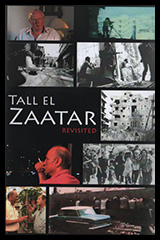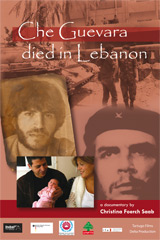Tartugo Films - Documentaries
DW Reporter: Glaube und Gewalt - steht der Libanon vor einem neuen Buergerkrieg?
http://www.dw.de/is-lebanon-facing-a-new-civil-war/av-17027246
Tall el Zaatar revisited
- A Lebanese Perspective -
 52 days of siege, 52 days of death and suffering: In 1976, Christian militias surrounded Tall el Zaatar camp. It was a Palestinian enclave in the middle of a Christian area. And this enclave was a strategically important armed stronghold of Palestinian militias. After 52 days of tight siege, it fell. Today, almost nothing resembles the camp of the 1970s. Nassim Assaad pays a visit to the camp where he grew up as a child. And where he, a Lebanese, was fighting alongside the Palestinian forces as a teenager. Walking through the street of the former camp, memories come back. And he finally confronts Abou Roy, whose idea it was to “finish” with the camp. Both engage on the difficult path of remembrance and reconciliation.
52 days of siege, 52 days of death and suffering: In 1976, Christian militias surrounded Tall el Zaatar camp. It was a Palestinian enclave in the middle of a Christian area. And this enclave was a strategically important armed stronghold of Palestinian militias. After 52 days of tight siege, it fell. Today, almost nothing resembles the camp of the 1970s. Nassim Assaad pays a visit to the camp where he grew up as a child. And where he, a Lebanese, was fighting alongside the Palestinian forces as a teenager. Walking through the street of the former camp, memories come back. And he finally confronts Abou Roy, whose idea it was to “finish” with the camp. Both engage on the difficult path of remembrance and reconciliation.
Director: Christina Foerch Saab
Executive producer: Ziad Saab
A Tartugo Films production
A Permanent Peace Movement project
Funded by Federal Republic of Germany Foreign Office
And Institute for Foreign Affairs (ifa)
Beirut 2012 All rights reserved
Running time: 27 minutes
Che Guevara died in Lebanon
 A cross-cultural love story with the backdrop of the Lebanese civil war: The director of this film goes on a journey, exploring her husband’s role during the Lebanese civil war, trying to find out what kind of person he must have been in the past. Ziad joined the military forces of the Lebanese Communist party voluntarily at a very young age and became one of the most influential commanders during the Lebanese civil war. The cold war had a big influence on Ziad’s life – as it influenced the life of Christina, who was active in the peace movement in West Germany. The film also highlights the changes Ziad went through after the war was over and how the post-war period continues to affect their lives as a couple and small family. War, peace and the power of love are the universal themes of this film, which are dealt with in a personal, very authentic manner.
A cross-cultural love story with the backdrop of the Lebanese civil war: The director of this film goes on a journey, exploring her husband’s role during the Lebanese civil war, trying to find out what kind of person he must have been in the past. Ziad joined the military forces of the Lebanese Communist party voluntarily at a very young age and became one of the most influential commanders during the Lebanese civil war. The cold war had a big influence on Ziad’s life – as it influenced the life of Christina, who was active in the peace movement in West Germany. The film also highlights the changes Ziad went through after the war was over and how the post-war period continues to affect their lives as a couple and small family. War, peace and the power of love are the universal themes of this film, which are dealt with in a personal, very authentic manner.
“The lineup includes a world premiere from Lebanon, Christina Foerch Saab’s Che Guevara Died in Lebanon, which is a brave, personal, cross-cultural love story and reflection on war and conflict. The film follows the director, a former peace campaigner from Germany, and her husband, a former commander haunted by the Lebanese civil war, as they piece together his past as a way to build a shared future.”
DUBAI INTERNATIONAL FILM FESTIVAL 2011
Director: Christina Foerch Saab
Running time: 80 minutes
Format: DigiBeta PAL 16:9
Production Company: Deltaproduction & Tartugo Films
Federal Republic of Germany Foreign Office & Dubai Film Market
Contact: Christina Foerch Saab
E-Mail:tartugofilms@gmail.com
Phone: 00961-3-500062 Tartugo Films office
For sales & distribution please contacttartugofilms@gmail.com
see also: Arabisches Filmfestival
Friendship (un)limited
 Ali and Toni are friends. Ali is a Muslim, Toni is a Christian. They like to hang out with each other, have a coffee or smoke Hubble-bubble. They talk about their families, work and sometimes about politics and the civil war. But just a little bit, not too much, so that no one gets hurt. Because before they became colleagues and friends, they were fighting each other unknowingly along Beirut’s Green Line, the borderline that separated Christian East Beirut from Muslim West Beirut. Ali belonged to the Shiite militia Amal and Toni to the Christian militia, the Lebanese Forces.
Ali and Toni are friends. Ali is a Muslim, Toni is a Christian. They like to hang out with each other, have a coffee or smoke Hubble-bubble. They talk about their families, work and sometimes about politics and the civil war. But just a little bit, not too much, so that no one gets hurt. Because before they became colleagues and friends, they were fighting each other unknowingly along Beirut’s Green Line, the borderline that separated Christian East Beirut from Muslim West Beirut. Ali belonged to the Shiite militia Amal and Toni to the Christian militia, the Lebanese Forces.
The film explores old fears of the two former fighters. It talks about the hope of friendship. And it also tackles Toni and Ali’s alienation from Beirut: Once Beirut was the city they were fighting for. They were ready to kill and to die for their beloved city. Nowadays, they don’t feel at home in the Lebanese capital because Beirut doesn’t belong to them but to the newly rich.
A documentary film by Christina Foerch Saab
A Tartugo Films production
A Permanent Peace Movement project
Funded by Federal Republic of Germany Foreign Office
And Institute for Foreign Affairs (ifa)
Beirut 2011 All rights reserved
Running time: 23 minutes
Peace Beats
Lebanese, Armenian and Palestinian rappers come together for a peace project and have one aim: To promote peace in Lebanon through their art. After having lived through various recent violent conflicts in 2007 and 2008, they get together to rap for a more peaceful co-existence. The film follows five of the participants, shedding light on their personal background, their motivation and their vision for the future.
Future TV, Permanent Peace Movement
War Kids – Documentary about Child Soldiers in Lebanon
This documentary explores the presence of child soldiers in Lebanon, starting from the period of the Lebanese civil war (1975 – 1990) until today. During the Lebanese civil war, basically all militias employed minors in the armed conflict. The film highlights two examples: teenage boys who were forced to fight for the South Lebanon Army; and two friends from the Communist party who joined the armed forces voluntarily, and then were caught by the Israelis and spent years in Israeli jails. After the war, the two major groups that still possess weapons also train minors in military action: The Palestinians and Hezbollah. Although the Palestinians might never actually fight, the idea of armed resistance is part of their identity – and probably also a strategy of survival in the atrocious living conditions in the camps. What Hezbollah is concerned, the Party of God claims that they don’t send minors into actual combat – but they do give military training to minors so that they’re ready to fight once they turn 18.
To employ children in armed conflicts is violating their rights to live in a safe and protected environment, according to the UN. This film was made with the support of the EU to raise awareness about the vulnerability of children in conflict situations.
Future TV, Permanent Peace Movement
Europe – History of a Union, Al Arabiya
Barcelona Process, Al Arabiya
Faith Matters – A German Pastor in Beirut, DW